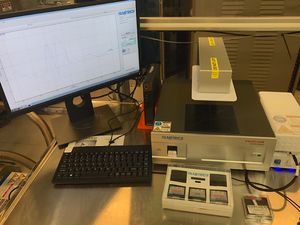Difference between revisions of "Optical Film Spectra + Optical Properties (Filmetrics F10-RT-UVX)"
(→About: link to JAw for RIx data) |
(Added photo) |
||
| Line 1: | Line 1: | ||
{{tool|{{PAGENAME}} |
{{tool|{{PAGENAME}} |
||
| − | |picture= |
+ | |picture=Filmetrics-F10-RT Photo.jpeg |
|type = Inspection, Test and Characterization |
|type = Inspection, Test and Characterization |
||
|super= Ning Cao |
|super= Ning Cao |
||
Revision as of 21:39, 6 June 2019
|
About
This tool simultaneously measures the optical transmission and reflection spectrum through a thin-film. Subsequent software analysis allows the user to calculate absorbance, color index properties, film thickness and/or refractive index. A Halogen lamp (Vis/nIR) and Deuterium lamp (UV) are available as light sources. The system has two spectrometers, spanning the UV (190nm) to near infrared (1700nm).
The data can optionally be modeled and the optical parameters (thickness, refractive index, absorption coefficient) are adjusted to give a best least-squared fit to the data. The accuracy of the technique will depend on the thickness of the film and the optical models used for the fitting of the data. For a more complete description go to Filmetrics.
For high-accuracy refractive index data, we recommend using the J.A. Woolam Ellipsometer, while The F10-RT will provide higher accuracy for thicker films and multi-layer coatings that the JAW has trouble modeling.
Equipment Specifications
- 190–1700 nm reflection & transmission spectrum (simultaneous)
- 10 Å to 150 µm film thickness, n, and k measurements
- Manual sample placement.
- Sample size 10 mm to 150 mm
- Data can be saved/retrieve for offline analysis
- Can model multiple layers, including periodic multi-layer stacks
- Can enter custom optical models or tabulated n/k data
